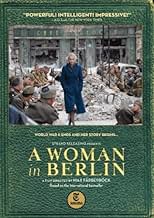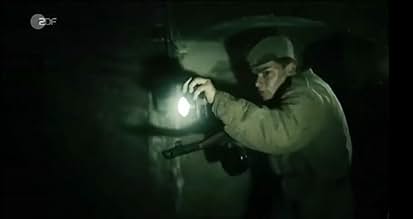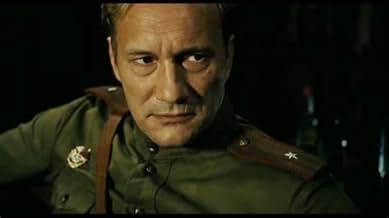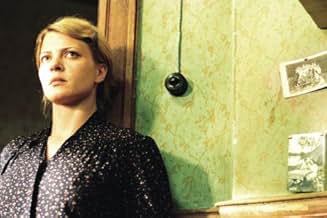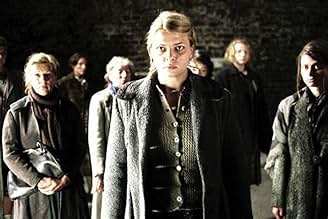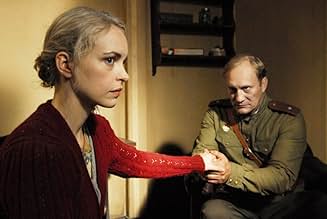IMDb RATING
7.0/10
7.3K
YOUR RATING
A woman tries to survive the invasion of Berlin by the Soviet troops during the last days of World War II.A woman tries to survive the invasion of Berlin by the Soviet troops during the last days of World War II.A woman tries to survive the invasion of Berlin by the Soviet troops during the last days of World War II.
- Director
- Writers
- Stars
- Awards
- 1 win & 4 nominations total
Evgeniy Sidikhin
- Major Andreij Rybkin
- (as Evgeny Sidikhin)
Viktor Zhalsanov
- asiatischer Rotarmist
- (as Victor Zhalsanov)
- Director
- Writers
- All cast & crew
- Production, box office & more at IMDbPro
Featured reviews
Anonyma - Eine Frau in Berlin – A Woman in Berlin - CATCH IT (B+) A Woman in Berlin (German: Eine Frau in Berlin) is an autobiographical account of the period from 20 April to 22 June 1945 in Berlin (Battle of Berlin). At the author's request, the work was published anonymously for her protection. The book purports to detail the writer's experiences as a rape victim during the Red Army occupation of the city. Two years after her death in 2003 the anonymous author was identified in the Süddeutsche Zeitung by Jens Bisky (a German literary editor) as Marta Hillers. (Wiki) The controversial German movie is about the women who survived the war by working as captivate prostitutes for the Russians. Just like every war all the men were killed and women were tortured and captured by the occupiers. The starting of the movie is really nice as how it shows how people have to go through and live through once Russians won over Germany. The women whose husbands were Nazi were bound to be raped and tortured by the occupiers. The performances by all the German actor and actresses and especially Nina Hoss, August Diehl & Evgeniy Sidikhin are admirable. Because the performances in these hard hitting movies makes you believe the situation. The beginning of the movie really good but the movie falls when they start showing the romance between German woman and the Red Army commander, it slowed down the phase. On the whole, A woman in Berlin is a really nice movie about the aftermaths of the War.
10hasosch
Max Färberböck, known to the world-wide audience since his "Aimee and Jaguar", shows in this newer film for once not the standard story of the bad Germans, who, deserving after what they have done, being Nazis, are liberated by the good Russians, the good Americans and the good Allies. It shows exactly the same experience that we all, who grew up in the East Block, had about our Russiand "friends". They came to rape, to destroy, to violate, to erase. It is a very interesting fact concerning mass psychology or perhaps better mass-psychosis that nobody normally speaks about the enormous amount of destruction done or caused by the liberators of end-World War II Europe. And nobody even mentions the Stalinist concentration camps. This is why we need films like "Eine Frau In Berlin".
However, in Färberböcks film, we see the Russians, "like animals, like pigs, an-alphabets, without culture" - as the Russian Major says it in his own words, he, who speaks, according to the main female character "a seldomly high-style Russian". Well, a little bit of "justness" had to be - not ALL Russians are like the "scum" (quotation from the movie) that we see. Interestingly, my Hungarian home-town had been bombed by Americans, but afterward the Russians came like vultures and pitched themselves into the ruins, what was female, was raped, what had been church or synagogue - was emptied and the treasures stolen, a subculture sneaking from the sou-terrain up to the ruins and even profiting from corpses and debris.
However, in Färberböcks film, we see the Russians, "like animals, like pigs, an-alphabets, without culture" - as the Russian Major says it in his own words, he, who speaks, according to the main female character "a seldomly high-style Russian". Well, a little bit of "justness" had to be - not ALL Russians are like the "scum" (quotation from the movie) that we see. Interestingly, my Hungarian home-town had been bombed by Americans, but afterward the Russians came like vultures and pitched themselves into the ruins, what was female, was raped, what had been church or synagogue - was emptied and the treasures stolen, a subculture sneaking from the sou-terrain up to the ruins and even profiting from corpses and debris.
I haven't read the diary, but my father has and after we watched this together, he said that they got everything from the compelling book with its important testimony. This review is based upon the version with a two hour running time and six minutes of credits. After Berlin was taken over by Russian soldiers(among them men who had not had sex for four years) at the end of WW2, and raped 100.000 women, leading to the death of 10.000 of them. When this was first revealed in the late 50's, the truth outraged many in the country. It was called an attack on the virtue of female Germans. Fortunately, it was re-released in 2003, and now this excellent adaptation has hit theaters. There is apparently also a longer cut, and if the standard of this is maintained, it is undoubtedly great and worth it. This is gripping from start to finish. It all comes across as real and authentic(helped by the fact that they speak the three languages they are supposed to), and since this is entirely objective and doesn't take any sides in the conflict, you feel for both groups. The acting performances are spot-on. This has some marvelous little touches and details, and it is historically accurate. The characters are complex and psychologically credible. This is immensely well-produced. The camera-work and editing put you right in the situation when this fits, and is in general expertly done. This has extraordinary lighting. There are a few light portions that keep it from being all sad(without it taking away from how touching and engaging the rest of it is). It is tense and unpleasant when it means to be, albeit it isn't outright depressing. The atmosphere is built up well. There is a bit of moderate sexuality, nudity of both genders, brutal violence and disturbing content in this. The DVD comes with a trailer for this and ones for other films. I recommend this warmly to everyone mature enough for it. What happened should never be forgotten. 8/10
A Woman in Berlin (2008)
Imagine the horrors of women caught in a large city during the chaos of war, with occupying troops storming your apartment building day after day. Well, think again. It isn't imaginable. I think even people who live through such things (and we are talking Berlin, 1945 for this movie) the truth is something that is pushed away. Because even watching a movie--a movie!--of these events is unbearable.
Not that the movie is unwatchable. Just the opposite. It's beautifully made, seeming to parallel that other recent German movie about the last days of the Nazi reign, "Downfall," 2004. But unlike that movie, this isn't about political history, or the history of war, or even the dramatization of historical figures as real people. This is a personal story, centering around one woman played by Nina Hoss, and about the repeated rape and abuse of women by the Russian troops for days and weeks on end. There was no escape, no power to complain to, no justice anywhere, anywhere, not German or Russian or even American (assuming they were any better) a mile or two away.
The movie is based on a book, "Anonyma," by a woman whose identity is not revealed, if it is even known (this was her protection even after death). The movie suffers now and then from a sameness, a steady pounding, beginning to end. The parade of horrors is continuous even as relationships develop and the first wave of anarchistic occupiers shifts to more entrenched troops and some general partying. You do cling to some semblance of progression, or of events to stand out from the others, but it's mostly about horribleness.
But maybe that's the way it should be. It was an endless nightmare on every level, even if you (they, these women) survive. In some ways, the end of the war is more believably insane here than in "Downfall" even though they are in many ways comparable movies, comparable moments. Such an array or gritty, believable acting and sets you won't find often. And thankfully, even the sentimental aspects are handled without swelling music and other cinematic tricks found too often this side of the Atlantic.
One last point, whatever you think of the Germans and WWII, here is yet another kind of national acknowledgment and, for many, soul-searching. This is a German film. The Russians don't come off great, for sure, but the Germans are clearly at fault, and are shown that way, and shown as responsible for even greater crimes. There's no glossing over any of it. Watch this movie. It won't be fun, but it'll be stirring and important.
Imagine the horrors of women caught in a large city during the chaos of war, with occupying troops storming your apartment building day after day. Well, think again. It isn't imaginable. I think even people who live through such things (and we are talking Berlin, 1945 for this movie) the truth is something that is pushed away. Because even watching a movie--a movie!--of these events is unbearable.
Not that the movie is unwatchable. Just the opposite. It's beautifully made, seeming to parallel that other recent German movie about the last days of the Nazi reign, "Downfall," 2004. But unlike that movie, this isn't about political history, or the history of war, or even the dramatization of historical figures as real people. This is a personal story, centering around one woman played by Nina Hoss, and about the repeated rape and abuse of women by the Russian troops for days and weeks on end. There was no escape, no power to complain to, no justice anywhere, anywhere, not German or Russian or even American (assuming they were any better) a mile or two away.
The movie is based on a book, "Anonyma," by a woman whose identity is not revealed, if it is even known (this was her protection even after death). The movie suffers now and then from a sameness, a steady pounding, beginning to end. The parade of horrors is continuous even as relationships develop and the first wave of anarchistic occupiers shifts to more entrenched troops and some general partying. You do cling to some semblance of progression, or of events to stand out from the others, but it's mostly about horribleness.
But maybe that's the way it should be. It was an endless nightmare on every level, even if you (they, these women) survive. In some ways, the end of the war is more believably insane here than in "Downfall" even though they are in many ways comparable movies, comparable moments. Such an array or gritty, believable acting and sets you won't find often. And thankfully, even the sentimental aspects are handled without swelling music and other cinematic tricks found too often this side of the Atlantic.
One last point, whatever you think of the Germans and WWII, here is yet another kind of national acknowledgment and, for many, soul-searching. This is a German film. The Russians don't come off great, for sure, but the Germans are clearly at fault, and are shown that way, and shown as responsible for even greater crimes. There's no glossing over any of it. Watch this movie. It won't be fun, but it'll be stirring and important.
ANONYMA - EINE FRAU IN BERLIN (A Woman In Berlin) is the painfully sensitive title of this exquisite film from writer/director Max Färberböck based on a once occult book by 'Anonyma' that has become a recent bestseller in Germany. It has the courage to tell the story of what it was like in Berlin as World War II was ending - the time of the Russian siege of the city just before and just after Hitler committed suicide, ending the horror of the Nazi regime. While many films have been made about the German populace and how they coped with the fall of their 'great Third Reich' country that was to rule the planet, few have been able to allow the audience to understand the brutalities of war on the people of Germany in so direct a fashion. It is a film that will haunt the viewer for a long time, a film that will restore some dignity to the German people who lived through it, not being part of Hitler's madness but being trapped in the ugliness that followed his fall.
Anonyma (Nina Hoss) is a journalist, a pretty woman living in the cellars and other hiding places while the Russians took over Berlin. She helps her fellow survivors of the bombing of Berlin, struggling for food and protection. The Russian soldiers, still angry with the gnawing hatred for the Germans from the Siege of Leningrad and the loathing of anything that exists in Hitler's Berlin, drink heavily and seek out the women from hiding to satisfy their insatiable lust. 'Berlin is a German whorehouse' and all women, from children to youngsters to elderly fraus are continually raped and beaten as part of the victors' rage. Anonyma speaks several languages including Russian and decides her only hope for survival is to align with the Commander of the troops, Major Andreij Rybkin (Yevgeni Sidikhin), believing that if she becomes his concubine she will be safe from the random raping by the rest of the soldiers. Their liaisons become more than outlets for the Major and the two gradually bond despite the horrors outside their rendezvous. They survive. Hitler commits suicide and the war is over and the two face the reality of returning to their previous pre-war lives...or can they?
Nina Hoss is brilliant in this difficult role and though the script allows her little to say, she conveys so much through her expressions that words are nearly unnecessary. Likewise, Yevgeni Sidikhin captures the dichotomy of emotional response his character must display, finding just the right balance between the conquering Russian soldier and the compassionate and vulnerable lover. The cinematography by Benedict Neuenfels captures the devastation not only of the buildings but also of the emotions of both sides of the participating groups and Zbigniew Preisner is responsible for the musical score that adds immeasurably to the drama. This is one of the great German films that took many years of maturing to make. It should be seen.
Grady Harp
Anonyma (Nina Hoss) is a journalist, a pretty woman living in the cellars and other hiding places while the Russians took over Berlin. She helps her fellow survivors of the bombing of Berlin, struggling for food and protection. The Russian soldiers, still angry with the gnawing hatred for the Germans from the Siege of Leningrad and the loathing of anything that exists in Hitler's Berlin, drink heavily and seek out the women from hiding to satisfy their insatiable lust. 'Berlin is a German whorehouse' and all women, from children to youngsters to elderly fraus are continually raped and beaten as part of the victors' rage. Anonyma speaks several languages including Russian and decides her only hope for survival is to align with the Commander of the troops, Major Andreij Rybkin (Yevgeni Sidikhin), believing that if she becomes his concubine she will be safe from the random raping by the rest of the soldiers. Their liaisons become more than outlets for the Major and the two gradually bond despite the horrors outside their rendezvous. They survive. Hitler commits suicide and the war is over and the two face the reality of returning to their previous pre-war lives...or can they?
Nina Hoss is brilliant in this difficult role and though the script allows her little to say, she conveys so much through her expressions that words are nearly unnecessary. Likewise, Yevgeni Sidikhin captures the dichotomy of emotional response his character must display, finding just the right balance between the conquering Russian soldier and the compassionate and vulnerable lover. The cinematography by Benedict Neuenfels captures the devastation not only of the buildings but also of the emotions of both sides of the participating groups and Zbigniew Preisner is responsible for the musical score that adds immeasurably to the drama. This is one of the great German films that took many years of maturing to make. It should be seen.
Grady Harp
Did you know
- TriviaThe movie's source novel is the diary of an unnamed woman, called Anonyma, from April 29, 1945 to June 22, 1945.
- GoofsWhen Germany's surrender is announced, the Soviet troops start singing the "Alexandrov version" of their national anthem, adopted about a year earlier. That version had no lyrics until Stalin intervened, and the heavy fighting wouldn't have allowed the soldiers to learn them. They most likely sang the chorus of "The Internationale," an earlier, better-known version.
- ConnectionsFeatured in History: Anonyma - Die Frauen von Berlin (2010)
- How long is A Woman in Berlin?Powered by Alexa
Details
- Release date
- Countries of origin
- Official site
- Languages
- Also known as
- Anónima - Una mujer en Berlín
- Filming locations
- Production companies
- See more company credits at IMDbPro
Box office
- Gross US & Canada
- $294,014
- Opening weekend US & Canada
- $12,439
- Jul 19, 2009
- Gross worldwide
- $1,863,939
- Runtime2 hours 11 minutes
- Color
- Sound mix
- Aspect ratio
- 2.35 : 1
Contribute to this page
Suggest an edit or add missing content



